- Home
- T. A. Pratt
Queen of Nothing (Marla Mason Book 9)
Queen of Nothing (Marla Mason Book 9) Read online
Queen of Nothing
A Marla Mason Novel
by T.A. Pratt
For Aislinn
Three Days Late
“Well that theory didn’t pan out,” Rondeau said.
“I confess I had little faith that it would.” Pelham nudged the undisturbed patch of sand at the back of the cave with his toe. The dusty, cool air smelled of canned beans, and, as an inevitable corollary, farts.
Rondeau sat down on a dusty cooler and leaned his back against the cave wall. “I don’t know, it seemed sort of... mythic. She didn’t come back to life on schedule, so I thought maybe if we waited three days, then she’d resurrect. We’re in a cave. She’s a god who’s also a mortal. I thought that’s how these things were done.”
“We don’t even have a stone to roll back, and I don’t think Mrs. Mason’s godhood is particularly related to Christian mythology.”
“Oh, sure, but the rule of threes, that’s a thing, right?”
“In comedy, as I understand it.”
Rondeau scowled. “In magic too, Pelly. Triple goddess. Three-fold law. Junk like that. We could keep waiting, but I’m not a big fan of desert camping under any circumstances, especially indefinite ones. It looks like Marla isn’t coming back from the underworld to spend a month on Earth as a mortal like she usually does. So... do we have theories? Is her failure to appear more like forgetting to go to the dentist, or like being kidnapped by a murder cult?”
Pelham wandered away from the plot of sand where, in the past, their mutual friend and intermittent employer Marla Mason, part-time goddess of death, had returned to the mortal world, typically rising up naked and sand-caked and cranky. “There could have been some sort of... mythological emergency. Something that required her attention as a god, and delayed her return to mortality?”
Rondeau hrmphed. “You’d think she’d at least answer our calls then.” The underworld didn’t have phones, or eat least not ones mortals could reach, but there were certain procedures in place to send Marla messages: writing notes and burning them on a fire made of rotten wood and animal bones, lighting black candles and chanting in a circle of salt, yelling into open graves, things like that. She very rarely answered those messages—when she was in goddess-mode, she paid as little attention to the goings-on of mortals as Rondeau did to insects buzzing around a porch light—but surely if she knew she was going to be late she’d make an exception, and send an apparition of a flaming dog skull to bark her new schedule at them, or something. Rondeau would’ve settled for an entirely non-eldritch email.
Then again, maybe it just hadn’t occurred to her. Even mortal Marla wasn’t the most considerate when it came to valuing other people’s time, and when she was in Bride of Death mode, she was about as warm and thoughtful as a bad case of hypothermia. But.... “It’s possible she’s just being an inconsiderate asshole,” Rondeau said. “Maybe even probable. But we can’t rule out the idea that she’s in trouble.”
Pelham nodded. “Indeed. But what sort of help can we possibly offer, if she is?”
“I could summon an oracle.” Rondeau shuddered at the thought. “There are old wild spirits all over this valley. I could find one and ask it what’s going on.”
“Hmm,” Pelham said. “The last time desperation led you to summon an oracle, we were nearly killed, and we were exiled from Las Vegas. If Marla hadn’t convinced the Pit Boss to let us return, we would still be homeless.”
“There’s that. There’s also the problem that gods don’t usually like people asking questions about them. If I summon an oracle and ask it to reveal secrets about a being of immense power? It would try to answer, because they always do, but the price for that answer could be more than I’m willing or able to pay.”
“It is Mrs. Mason, though,” Pelham said simply.
“Yeah. It’s Marla. I know.” Rondeau suddenly perked up. “Hey, hold up. I’m not the only guy on this side of the Rockies who can summon oracles anymore. Bradley Bowman is in San Francisco now. He’s got all the same powers I do, and he knows a hell of a lot more about how to use them properly. He’s got a lot more experience.”
“He also diligently studies and applies himself.”
“Yeah, I know.” Rondeau shook his head in wonderment. “Some people are so weird.”
“Shall we call him?” Pelham said.
“Huh.” Rondeau stood up and began to pace around. “I don’t actually have his number. I mean, B wasn’t even living on this plane of reality until recently. Do autonomous fragments of multiversal collective meta-gods even have phones? I could get in touch with Perren River in Felport, and she could probably find me a number for Sanford Cole in San Francisco—all the chief sorcerers know how to reach each other, more or less—and Cole would know where to find B, they’re working together again....”
“But Perren would ask questions,” Pelham said. “It may be better, perhaps, if people don’t realize Marla Mason has failed to return to Earth.”
Rondeau nodded. “Trouble in the realms of gods is the sort of thing sorcerers are interested in for all kinds of reasons, most of them bad. Maybe it doesn’t matter, but I don’t want Marla getting pissed at me for talking out of turn. Cole’s part of her inner circle, and B’s like a kid brother to her, so they’re safe to loop in on this.... We could just start driving, and we’d get to San Francisco in eight or ten hours, depending on traffic. Once we get there, I know where Cole hangs out, we can do this face-to-face, old school.”
“Do we dare leave this place unattended, though?” Pelham said. “What if Mrs. Mason arrives tomorrow, or the next day, and laments our absence? I would worry less if she had cultists here to greet her....” He trailed off. The existing cult of the Bride of Death had been slaughtered by an ancient otherworldly monster they’d discovered in the caves below Death Valley, and though Rondeau and Pelham had expected more weirdo zealots to drift into the valley, drawn by mysterious compulsions, no one had shown up yet. Which, in retrospect, was kind of ominous in itself.
“We could park her motorcycle in the cave,” Rondeau said. “Nobody’s going to wander in here, the place is magically concealed, so it should be safe. We’ll leave the suitcase with her clothes and stuff. There’s food and water. Hell, we’ll even leave a note, and her phone, so she can call us if she does come back. If Marla’s anything at all, she’s self-sufficient.”
“I admit, I grow anxious just waiting, and it would be pleasant to take action, of whatever sort.”
“Yeah,” Rondeau agreed. “Forward motion is a good way to distract yourself from being scared as hell.”
•
Their RV looked like a battered piece of junk, but it was ensorcelled to run perfectly, and after recent upgrades it could even drive fully autonomously, with an illusory figure—who looked like an old man who got his fashion advice from the golf channel—in the driver’s seat to keep people driving past from freaking out. (They could have cast a look-away spell on the vehicle, of course, to keep people from noticing, but that was a bad idea, unless you enjoyed being rear-ended and sideswiped by other drivers who simply didn’t notice you there.)
Rondeau piloted the RV out of Death Valley himself rather than engaging the auto-drive, because even though he loved sloth and indolence almost as much as he loved runny cheese and oral sex (albeit not in combination), at the moment he wanted to feel like he was doing something. They rolled down a bumpy dirt road, through the scrub and sand and surprise patches of wildflowers, and as usual didn’t see another living soul... except one.
There was a woman in oversized sunglasses relaxing in one of those folding poolside lounge chairs, improbably sitting in a clear patch of sand, no vehicle or campi
ng gear in sight. She wore a skimpy red bikini that matched her bright red hair so perfectly it was like they’d been dyed to be identical, and she was so pale that Rondeau winced at the thought of what the sun was doing to her: the woman was courting melanoma. She was probably late thirties or early forties, and he vaguely noted that she was pretty, though these days he lusted after boys almost exclusively. What was she doing out here, though? Who came to Death Valley to sunbathe?
She raised a hand and waved at him lazily as he went past, and he waved back, out of bewildered politeness. Oh well. People were weird. He didn’t think of the woman much after that... until later, when he had good reason to.
•
Once they hit the highway Rondeau and Pelham mostly hung out in the RV’s living area and let the vehicle drive itself. They played desultory hands of gin rummy, took naps, and read as they cruised along the freeways. Since they had food in the cupboards and a toilet in the back and enough room to stand up and stretch their legs as required, they didn’t even stop for pee or food breaks. Rondeau had spent most of his life on the East Coast, and it was still strange to him that you could spend so many hours driving and still be in the same state. California had a surpassing bigness about it.
They arrived in San Francisco right in the thickest part of evening rush hour, reduced to crawling through the congested streets. No amount of magic could make their progress any faster, at least not without flinging the obstructing vehicles out of the roadway, which was probably beyond their capabilities anyway, and would in any case get them in trouble with the same local magical authorities they were hoping to ask for help. Eventually they got to the right block and Rondeau took the wheel, then found a nice big stretch of red curb in front of a fire hydrant not far from the tiny bookstore in North Beach where Sanford Cole currently held court.
“I think I have a look-away charm.” Pelham patted the pockets of his jacket. “To keep us from getting a parking ticket.”
The fact that Pelham wasn’t fretting over the unlawful transgression of parking illegally demonstrated real progress in his moral flexibility, something Rondeau appreciated. “Nah, don’t worry about it. I’m friends with the sorcerer who runs the city. Save the charm for an emergency. It’s not like we can get towed.” The anti-theft charms on the RV were more than sufficient to prevent its removal by legal means, too.
“I feel terribly grubby.” Pelham attempted to smooth out his old-fashioned suit, which to Rondeau’s eye looked not even remotely rumpled. Rondeau grunted. He was dressed in a blue vintage ‘50s bowling shirt and brown corduroy pants. He usually made more of a sartorial effort, but a few days waiting in a cave in the desert had dinged his enthusiasm for fashion.
The used bookstore was a small storefront squeezed between an artisanal toast restaurant on one side and a cell phone store on the other. The glass door had gold leaf lettering that read Singer’s Books. Under hours it just said “Variable,” but the hanging sign in the window read “OPEN.” A bell rang when they pushed their way in. The shop was deep and narrow, or at least it seemed narrow, with floor-to-ceiling shelves on all the walls and freestanding as well, forming a maze of book-lined aisles that were barely wide enough to squeeze through. The cashier’s nest was practically a fort made of shelves surrounding a beaten-up wooden desk. A young woman with dreadlocks and ostentatiously chunky glasses sat on a stool, marking her place in a trade paperback copy of a volume titled Final Girl with her finger. Her smile was distracted but genuine. “Help you?”
“I’m looking for a quaint and curious person of forgotten lore,” Rondeau said. “Sanford Cole?”
She kept frowning, and she was no longer at all distracted. “Sorry, I don’t know who that is.”
“My name’s Rondeau. What’s yours?”
She frowned, and he thought she wouldn’t answer, but she shrugged and said, “Tessa.”
“Good to meet you, Tessa. Cole knows me. I hear these days he’s hanging out in the back room of this shop. If he’s not around, I can wait.” He glanced around. “There’s plenty to read, anyway. Way better than most waiting rooms.”
“You might as well wait for Godot, because I don’t know anybody named Cole. But there’s no law against browsing.” She went back to her book, but the tension in her posture was obvious. Rondeau wondered if she was an apprentice or a full-fledged sorcerer. Maybe a bibliomancer. He hadn’t seen her push a button or send a signal, but that didn’t mean she hadn’t communicated his presence in some way. He could get insistent, but he was tired after the drive, so he figured he’d give it some time.
Rondeau sauntered through the shop with Pelham. This seemed to be one of those bookshops obsessed with taxonomy, with divisions and sub-divisions of category noted on the shelves with handwritten labels. Like, they didn’t just have “Children’s Literature,” they had “19th-Century Children’s Literature” and “Picture Books by Author-Illustrators” and “Weird Creepy Old Children’s Books” and so on. Pelly oohed over a shelf featuring old books on etiquette, full of sample letters for writing to monarchs and cardinals and ambassadors, and guides to formal dining traditions in Austria-Hungary, and sumptuary codes. Rondeau’s interest in books began and ended with crime and mystery novels, and there was a pretty good selection here, including a couple of old McBain’s he hadn’t read yet, in a section marked “Police Procedurals.” The adjacent section on “Amateur PIs” probably deserved a look too.
In an adjacent aisle a woman laughed, a raucous but not unpleasant sound, and it somehow tickled the back of Rondeau’s brain. He didn’t recognize the laugh, exactly, but hadn’t he known someone who laughed like that, if in a different voice?
A middle-aged redhead appeared, wearing a blue and white dress in a shifting optical-illusion sort of pattern, clutching a copy of the Principia Discordia and chuckling to herself. She caught Rondeau’s eye, winked, and vanished around a shelf. She definitely looked familiar... or was it just that bright red hair, so much like the woman he’d seen sunbathing in Death Valley? Could it be the same person? It was hard to tell—the sunbather had been wearing sunglasses, and rather less clothing—but maybe. Were they being stalked? Or, no, the woman had been here before they arrived, or they would have heard the bell over the door ring when she came in, so... reverse-stalked?
Rondeau didn’t dismiss the idea that he was paranoid, but he also didn’t reject the possibility that he wasn’t. A few moments later he heard the bell tinkle, and leaned out of the aisle to see the woman disappear out the front door, carrying a paper bag with her purchase. Hmm. Just what he needed. More things to worry about.
A moment later, the clerk turned the “Open” sign to “Closed” and walked over to him. “So, uh—Rondeau, was it?”
“That’s me,” he said cheerfully.
“So that’s Mr. Pelham?”
“You’re two for two, Tessa.”
“Sorry for earlier, I just had to check, and then I needed to make sure there was no one else in the shop.” She took a particular book down from the shelf she was standing beside, then put it back in, upside down. She gave Rondeau a smile and walked away.
Okay. That was a weirdly inconclusive interaction. Rondeau turned back to the shelf of mysteries—and instead of the shelf, there was a door, standing partially open, but not wide enough to reveal much of the space beyond, except the presence of more bookshelves there. Definitely not just a secret door; this wasn’t a bookshelf on hinges. This was a magically concealed entrance, and one hidden well enough that even Rondeau’s illusion-sense hadn’t tingled in its presence. (Bradley probably would have seen right through the glamour, but he preferred to see the world as it truly was, while Rondeau cultivated a certain amount of willful blindness; it made the world a prettier place.) Rondeau whistled, and Pelham hurried over to join him. “A half-open door, Pelly. Would you call that an invitation?”
Pelham cleared his throat and rapped his knuckles on the door.
“Come in!” a familiar voice called.
; Pelham pushed the door open the rest of the way and stepped through, and Rondeau followed. The door swung shut behind him with a definitive click, and when Rondeau looked back, there was no door visible at all, just a shelf of books... showing not the spines of books but the reverse edge, as if Rondeau had wandered around the back of a bookshelf. He turned back, and suddenly there was Sanford Cole, white-whiskered and diminutive, sitting behind a desk piled high with volumes, peering at an old newspaper through a magnifying glass.
The room was surprisingly bright, with rectangular windows high up on the walls, above the ten-foot-high shelves. There was no sunlight at the moment in San Francisco—it was very nearly night—so that light was coming from elsewhere. Rondeau reached out, tentatively, with his supernatural senses, and decided they were in a pocket dimension, a bit of carved-up and snipped-out space created by a powerful sorcerer for use as a refuge or study.
Cole put down the magnifying glass and gave them a mild smile. “Ah, Rondeau, and Pelham. Always a pleasure. What brings you to my city?”
Rondeau suddenly felt underdressed. Cole was dignity personified. “Sorry to barge in, sir. We’re really looking for B, I mean Bradley, but we weren’t sure how to find him, or even if he was, ah, still around. Like, on this mortal plane or not.”
Cole nodded. “He is, and from what he’s told me, he intends to stay indefinitely. Apparently independent existence suits him, and he is in no great hurry to rejoin his collective. I’m afraid Bradley is not in the city now, though—he’s out on one of the sea islands with his apprentice, Marzi.”
Rondeau raised an eyebrow. “I thought Marzi was going to be your apprentice?”
Cole’s smile was a flash, there and gone. “So did she, and Bradley, too. But I told Bradley he was certainly experienced enough to take on his own student at this point. He is, after all, a tiny fragment of the intelligence that oversees the integrity of the multiverse itself. I have, of course, been happy to help and offer my guidance as needed.”

 Do Better: Marla Mason Stories
Do Better: Marla Mason Stories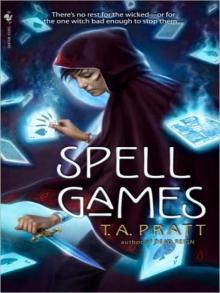 Spell Games
Spell Games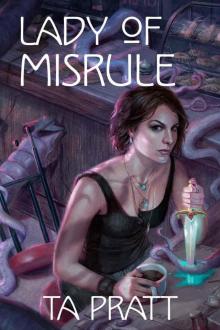 Lady of Misrule (Marla Mason Book 8)
Lady of Misrule (Marla Mason Book 8)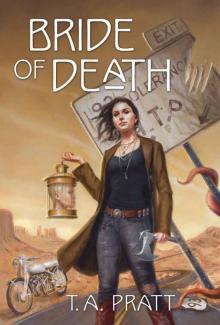 Bride of Death (Marla Mason)
Bride of Death (Marla Mason) Dead Reign
Dead Reign Blood Engines
Blood Engines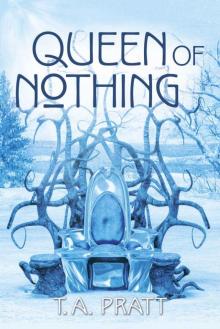 Queen of Nothing (Marla Mason Book 9)
Queen of Nothing (Marla Mason Book 9) Poison Sleep
Poison Sleep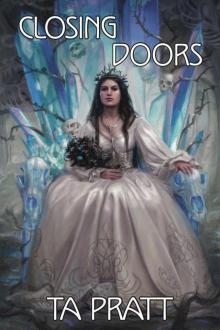 Closing Doors: The Last Marla Mason Novel
Closing Doors: The Last Marla Mason Novel